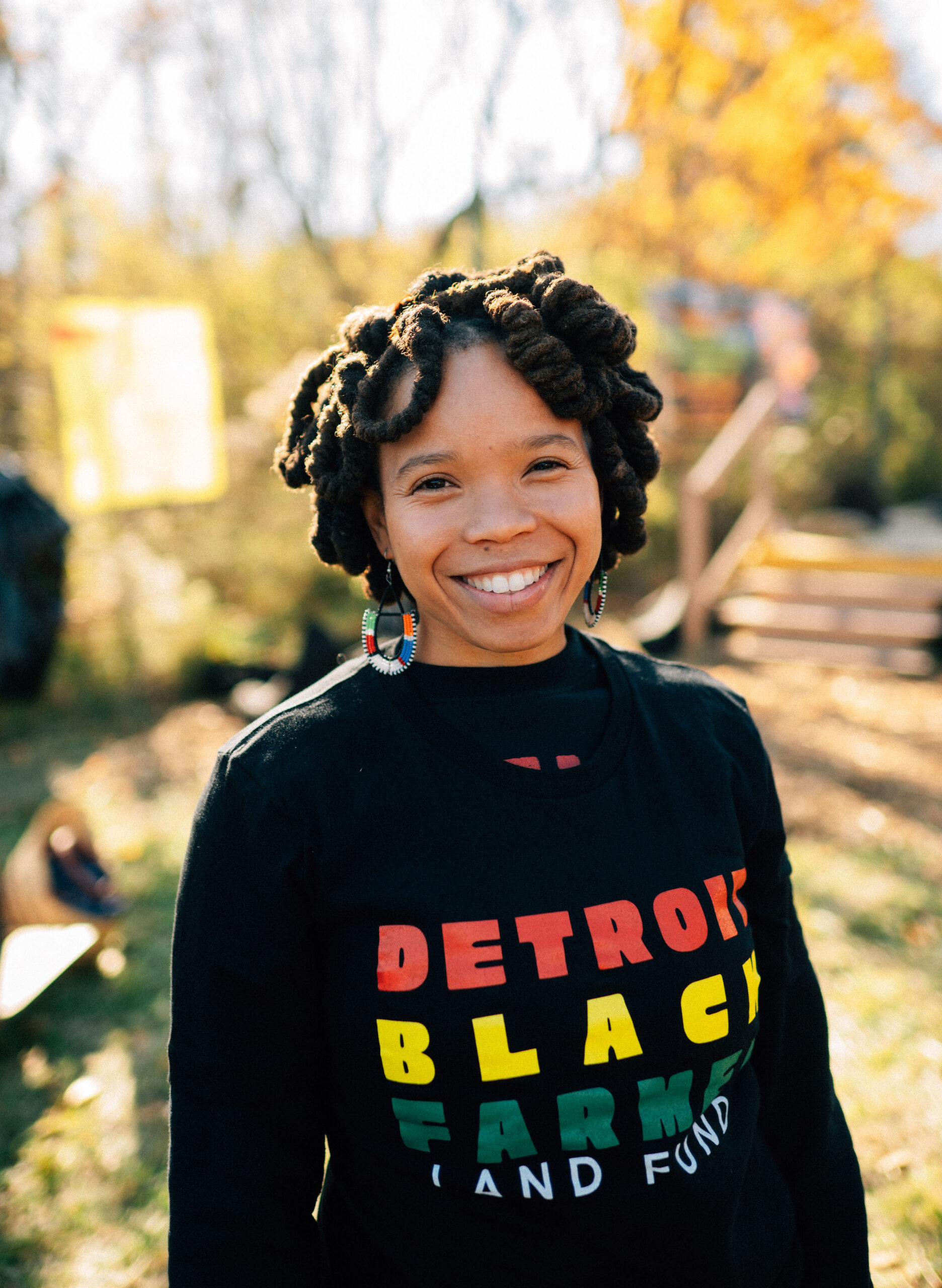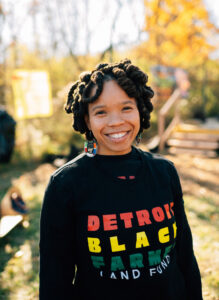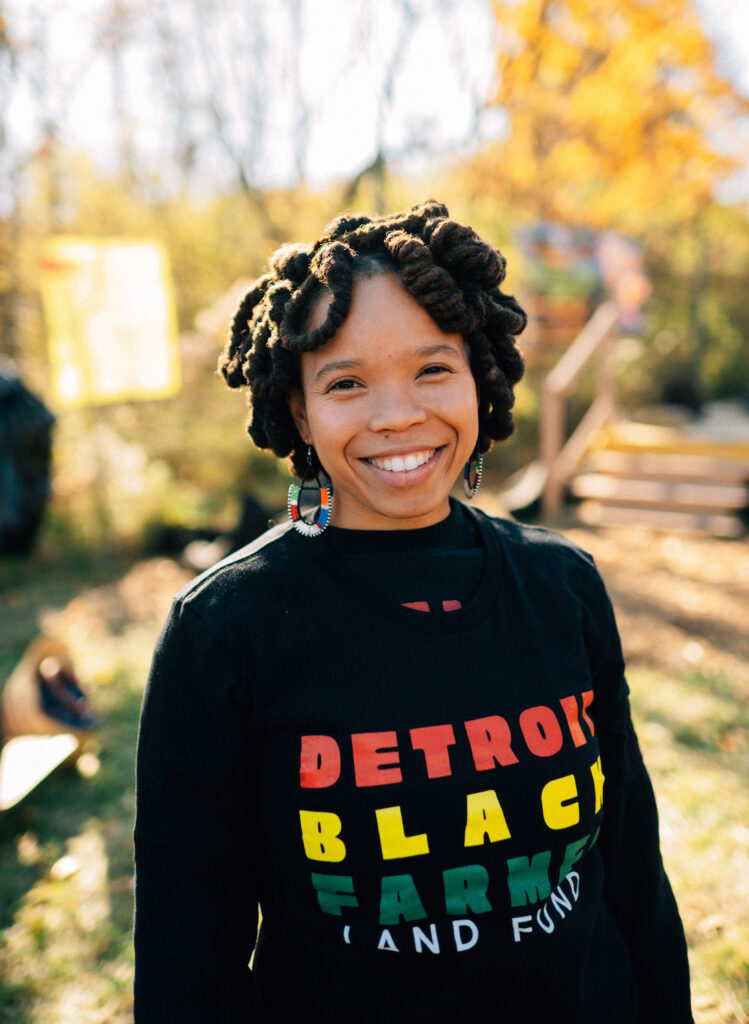Source: Special to Michigan News

Shakara Tyler, a lecturer in the U-M School for Environment and Sustainability, says Detroit is a very unique city when it comes to urban agriculture.

Shakara Tyler, a lecturer in the U-M School for Environment and Sustainability, says Detroit is a very unique city when it comes to urban agriculture.
Shakara Tyler grew up in Philadelphia – a city, like most urban areas, that isn’t known for farming. But a deep-rooted interest in agriculture and a thirst to recover the stories of Black farmers have led her to research and document Black agrarianism and agro-ecology. Tyler, a lecturer in the University of Michigan School for Environment and Sustainability, has shown how the Black farming community plays an important role in food justice and food sovereignty including in the city of Detroit.
How did you become interested in agriculture and, in particular, in the Black farming community?
I grew up in the inner-city being one of those children who has always been deeply connected or having an affinity or connection to the natural environment around me. I loved animals, I loved trees, I loved to dig in the soil for worms. I always say that I came to the planet really loving all things ecology and really knowing that has something or a lot to do with my life’s purpose. It is spiritual for me. My emotional connection, my intuition of just feeling connected to these non-humans, knows that my spirit is connected to theirs. I felt that deeply as a child.
It was always interesting growing up in the inner-city, always longing to be in the forest and to be doing things that weren’t always readily available in the inner city, so I often had to go out and seek it. I continued to follow my passions. I knew when I got to college that I wanted to study something that was biological-, ecological- and environmental-based, so I studied agricultural sciences because I was very interested in animal science at the time and the intersection around food and politics. That’s the path I have been on since then.
What did studying agriculture teach you? How did it shape your research interests going forward?
In the College of Agriculture Sciences and Natural Resources at Penn State, where I did my undergrad, I was one of the very few people of color, even fewer Black people. Sometimes being the only Black person in my courses, whether it was animal science or plant science or soil science, I always felt ostracized.
I felt like I didn’t feel a sense of belonging; I was in a culture shock. Growing up, I was in a predominantly Black community and having this Black and brown diversity and then being the only the Black person in my classes, I just felt a really strong disconnection between histories that I knew were true but also about the reality of asking, ‘where are the other people in these spaces?’
So I began to branch out into conferences and workshops, and once again, I was the only Black person. I know my people have a strong history to the land, so why is this the case? For my sanity, I began to take a lot of African-American studies courses just so I could be with my people in an academic setting that nourished me in ways that other spaces didn’t. And even in those spaces, when I brought up land and food and things like that, it wasn’t a point of discussion; it wasn’t a priority or even a worthwhile point to analyze. It was this interesting in-between where there wasn’t really a home for me in environmental and agricultural studies as a Black student, and in the African-American studies spaces the environmental component wasn’t there, either.
How did you decide to work to change this?
I began to ask a lot of questions: Why is this the case? Am I crazy? What’s going on here? One of my mentors told me that should do some research because I have questions that only research can answer. So that’s what I did. I went to grad school to study ag literacy within Black communities. And to study the history of Black farmers and really find out different answers to the questions I had based on my experiences and not feeling a sense of belonging in either of these key spaces that felt so close to my identity. I studied the heck out of Black history and that caused me to be thrust into these food systems facing a racial equity and social justice lens.
I also became a mother at a very young age, so being a student of agriculture at the university level and then me having this baby, I wanted her to have a better diet than I had growing up. There were many angles that I wanted to address via what we were putting into our bodies. I began to grow food, and I started a garden when she was 3 years old because I wanted her to have a deep connection to food in ways that I didn’t have growing up as a young child.
You mentioned having a personal thirst and quench for the research you had to create. What effect does that research have on society now and why is Black agrarian history important?
From a certain vantage point, our history as it relates to land and food that doesn’t center on enslavement had been erased. It had became vastly invisible for a very long time, and we’re reclaiming it and it’s resurfacing. We’re in the process of regenerating this history in really accurate and beautiful ways. For a while, I feel like it was it was invisible. It was ignored. It was stolen. These are very strategic systemic erasures and loss that we became victims of.
We often say you don’t know where you’re going unless you know where you came from. Studying our history and being aware of all of the deep nuances of Black ag history is so important for what we’re doing today. We have to know we are not reinventing the wheel, and we are building on the literal bodies and the victories and the struggles and the suffering of our ancestors, so we are literally standing on their shoulders, pushing forward the work that they died for – the work that they hoped we would carry on through their legacies. Learning and caring for Black ag history is important from a spiritual level, cultural level, political, social, economic level, but to us, it’s all intersectional.
White supremacist world views siloed these things, but to us there’s no separation between the social and political or even the cultural and economical. To us, it’s all collapsed into intersectional framing, so the history is significant on all of those things simultaneously and equally. We have to pay homage to the work that is done before us because then we are completely playing into the strategic erasure that our oppressors would like us to enact for obvious reasons. It is an act of liberation to know our history. We take that very seriously knowing we were meant to not know our history; we were meant to not know because we were stolen from African villages centuries ago for our genius and our innovations in building agricultural systems on civilization level. We were involuntarily forced to come to this continent to build up the rice industry, build up the cotton industry, the tobacco industry – these industrial crops that made the U.S. empire as wealthy as it is today. This entire agricultural system of the first world was built on our African ingenuity and knowledge, and knowing that is an extreme source of power.
You are on the board of several Detroit-based organizations that are helping to bring food sovereignty and food justice to the Black community. What is being done in Detroit and what still needs to happen?
Detroit has become a home in various respects for me. As a person who did not grow up in Detroit, I have been learning so much about Detroit as a haven of Black power historically and a very strong conduit for Pan-Africanism. And just like radical community-organizing –– not even on a regional or national level, but global –– Detroit has illuminated as a world-class example of what self-determination looks like for people who have been dehumanized and have essentially been thrown away and exploited. And still we stand. There is a lot of resilience and unapologetic self-determination in Detroit, and it is very beautiful and it has taught me a lot of lessons.
Detroit is a very unique city in regards to urban agriculture. With a huge decline of population due to white flight, there is a huge amount of vacant land available, and enormous opportunities exist for agricultural land use. Detroit has become international poster child for urban ag for those reasons. Detroit also has been a huge site of relocation for Black migrations throughout the 20th century, and a lot of Black folks running from racial terrorism found home and took root in Detroit, and they brought their agricultural knowledge from the South to the North and manifested it in community gardens and all kinds of food and farm establishments. That Black agrarian history that has been supplanted in Detroit and physical amount of territory available, and the unapologetic politics around self-determination and Black power, have created beautiful storm of sorts where these things intersect where Black food sovereignty is a real possibility.


